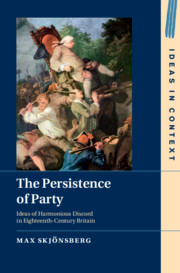Book contents
- The Persistence of Party
- Ideas In Context
- The Persistence of Party
- Copyright page
- Dedication
- Contents
- Figures
- Acknowledgements
- Note on the Text
- Abbreviations
- Introduction
- Chapter 1 Background, Contexts, and Discourses
- Chapter 2 Rapin on the Origins and Nature of Party Division in Britain
- Chapter 3 Bolingbroke’s Country Party Opposition Platform
- Chapter 4 David Hume’s Early Essays on Party Politics
- Chapter 5 Faction Detected? Pulteney, Perceval, and the Tories
- Chapter 6 Hume on the Parties’ Speculative Systems of Thought
- Chapter 7 Hume and the History of Party in England
- Chapter 8 Political Transformations during the Seven Years’ War: Hume and Burke
- Chapter 9 ‘Not Men, But Measures’: John Brown on Free Government without Faction
- Chapter 10 Edmund Burke and the Rockingham Whigs
- Chapter 11 Burke’s Thoughts on the Cause of the Present Discontents
- Chapter 12 Burke and His Party in the Age of Revolution
- Chapter 13 Burke and the Scottish Enlightenment
- Conclusion
- Bibliography
- Index
Chapter 4 - David Hume’s Early Essays on Party Politics
Published online by Cambridge University Press: 27 January 2021
- The Persistence of Party
- Ideas In Context
- The Persistence of Party
- Copyright page
- Dedication
- Contents
- Figures
- Acknowledgements
- Note on the Text
- Abbreviations
- Introduction
- Chapter 1 Background, Contexts, and Discourses
- Chapter 2 Rapin on the Origins and Nature of Party Division in Britain
- Chapter 3 Bolingbroke’s Country Party Opposition Platform
- Chapter 4 David Hume’s Early Essays on Party Politics
- Chapter 5 Faction Detected? Pulteney, Perceval, and the Tories
- Chapter 6 Hume on the Parties’ Speculative Systems of Thought
- Chapter 7 Hume and the History of Party in England
- Chapter 8 Political Transformations during the Seven Years’ War: Hume and Burke
- Chapter 9 ‘Not Men, But Measures’: John Brown on Free Government without Faction
- Chapter 10 Edmund Burke and the Rockingham Whigs
- Chapter 11 Burke’s Thoughts on the Cause of the Present Discontents
- Chapter 12 Burke and His Party in the Age of Revolution
- Chapter 13 Burke and the Scottish Enlightenment
- Conclusion
- Bibliography
- Index
Summary
Few, if any, political thinkers of the eighteenth century dealt as thoroughly and extensively with party as David Hume (1711–76). This chapter considers Hume’s first batch of essays on British politics, published in 1741–2. Hume analysed how the Whig–Tory and Court–Country alignments were integral to British party politics, with the former dividing the political nation along dynastic and religious lines and the latter being a natural expression of the workings of the mixed constitution and interparliamentary conflict. His analysis can be read as a compromise between Bolingbroke and Walpole. Yet it was something more than that – and arguably the most ambitious attempt to make sense of party in British politics to date.
Keywords
- Type
- Chapter
- Information
- The Persistence of PartyIdeas of Harmonious Discord in Eighteenth-Century Britain, pp. 111 - 139Publisher: Cambridge University PressPrint publication year: 2021

